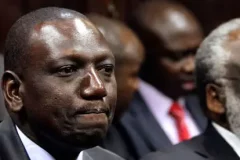
When a WhatsApp message I sent to a colleague hadn’t been delivered after 20 minutes, at first I thought my mobile internet had started acting up. So I switched my data service provider from Etisalat to MTN, yet nothing changed. Oh, wait. I also moved 200 meters to another building, with the hope that my phone would pick up stronger signals. Finally, I restarted my phone, but the tick still hadn’t appeared under my WhatsApp message. It was at this point Tomiwa’s Slack message dropped and I realised, oh shoot! The problem was WhatsApp…and Facebook. And Instagram.
Facebook’s apps’ recent outage has raised concerns again about the influence Mark Zuckerberg wields over mind share globally and the need for viable local social media alternatives. The overdependence is not helped by recent revelations of Facebook’s favouritism for its home-user base and its history of manipulation of public opinion by external interests. It got me thinking. What would it take for countries—African countries—to wrest Facebook’s grip off its markets and build indigenous, widely used and financially successful social media platforms?
A tall order? Yeah. But China has produced WeChat, a society of 1 billion users. The Kremlin too has Vkontakte. Known to the rest of the world as “Russian Facebook”, Vkontakte is a playground of 78 million users and the leading social media network in the country.
PARTNER MESSAGE

The 6th season of Nigeria’s biggest and most anticipated reality tv competition, Big Brother Naija (BBNaija) has ended. In the course of this edition, we have seen some of the most innovative and captivating adverts from partner brands.
Here are some of the best adverts from BBNaija 2021.
PARTNER MESSAGE

Create a FREE online store that allows you to sell to anyone, anywhere in the world right away. No technical knowledge required, just set up your Flutterwave Store with a few clicks and start selling. Click here to get started immediately.
Creating social media giants and, indeed, massive internet companies require widespread infrastructure, a rain of capital, world-class entrepreneurial experience and skills, armies of talent, government support and, of course, a sound economic base. The interesting fact is that some African countries have equally good economic indicators as China and Russia when their giant internet companies first went live.
In 2000, the year after the launch of Tencent’s QQ, China’s second-largest social network, China had a per capita income of $2,620 and about 20 million mobile phones connected to the internet. On the other hand, the current average income earned per individual in Egypt, South Africa and Nigeria is $12,210, $11,870 and $5,000 respectively. Their internet users also number 50 million, 36.5 million and 80.49 million users respectively.
There are pessimists who argue that Africa could never produce globally relevant internet companies because of an inadequate supply of, especially, engineering talent. But China too never had sufficient talent or entrepreneurial experience to begin with. Its earliest batch of internet companies were built by postgraduate students at American universities who returned home to unashamedly copy and paste Silicon Valley innovation and transfer knowledge to troves of employees. Our continent too has a globally respected diaspora talent pool. The difference is, they aren’t as interested in returning.
This is where the quality of governments and attractive policies come in.

It seems countries that have usurped US cyber dominance over their markets have sovereign governments with world power ambitions which have driven them to independent thinking and home-grown solutions. For example, China deployed aggressive, local-content policies that ensured foreign technology contractors employed, primarily, Chinese workforce and moved their R&D operations over. China established a rewarding meritocratic system that spurred millions of talents to excellence and out of poverty. Not forgetting the controversial Great Firewall which discouraged foreign competitors such as Internet Explorer, Google and, recently, WhatsApp. China also introduced government-led venture funding and strings of talent accelerators and scientific research institutes—a crucible of original ideas and innovation and a critical element missing from many of Africa’s education systems. It’s this tenacious army of independent and ambitious thinkers, financed by government and US venture capital, and supported by protectionist policies, that has birthed China’s multi-trillion-dollar technology ecosystem.
Rwanda’s Kagame-led government seems to be the only African government with the Chinese government’s characteristics—independent thinking, embracing technology and pro-local content. Unfortunately, it hasn’t expressed interest in building its own social networks. But Ethiopia has. I’m not sure how it aims to roll back Facebook’s first-mover advantage and get reasonable market share without censorship. The government has said it wouldn’t be restricting Facebook access.
Please note. I’m not crusading for censorship.
By the way, Nigeria has a forum site visited 31 million times per month, on the average, according to SimilarWeb which gives a fraction of the accurate statistics. The platform is also the 9th most-visited site in the country. It’s called Nairaland and was founded in 2005 and built by the young developer Seun Osewa without government protectionist policies. But it hasn’t released new features in years. Nairaland has the potential to become a regional social network giant by introducing ancillary products its 2.58 million registered users would love—probably instant messaging, thereby enabling quick, direct and personal connection between contributors in private space, on and off the platform. What do you think?
Seun Osewa, we have an opportunity here.
PARTNER MESSAGE

Next on the Grit & Growth podcast, hear Martin Stimela of Brastorne Enterprises pitch his expansion plan and gain tips from Stanford Professor Matt Abrahams on how to grab attention, harness emotions and connect with your audience. Listen here.
From the Cabal
In case you missed these:
- In Kenya, a country of 52 million people, only a few formal media houses run print news. At an average cost of $0.54 per paper, reading the news can become expensive. But news aggregators are offering a new avenue for readers to access diversified content and human stories. Here’s all you need to know about it.
- Rejection is not final. Learn how Kemi went from selling fufu and dried fish on a university campus to almost working with Google, Amazon, Twitter and Palantir, and finally landing a software engineering role at the world’s biggest financial data and news company, Bloomberg.
- Globally, more than 75% of countries have poor or no street-addressing systems, according to the United Nations. In 2014, Timbo Drayson, who helped launch Google Maps in Europe, the Middle East, and Africa, encountered this problem for the first time while on a sabbatical travelling across East and West Africa in 2014. This experience inspired the founding of OkHi, a digital address verification startup. Here’s all you need to know about it.
Have a great week
Thank you for reading the Next Wave. Please share today’s edition with your network on WhatsApp, Telegram and other platforms, and reply to this email to let us know what we can be better at.
Subscribe to our TC Daily Newsletter to receive all the technology and business stories you need each weekday at 7 AM (WAT).
Follow TechCabal on Twitter, Instagram, Facebook, and LinkedIn to stay engaged in our real-time conversations on tech and innovation in Africa.
Adegoke Oyeniyi, Editor-in-Chief, TechCabal.

















